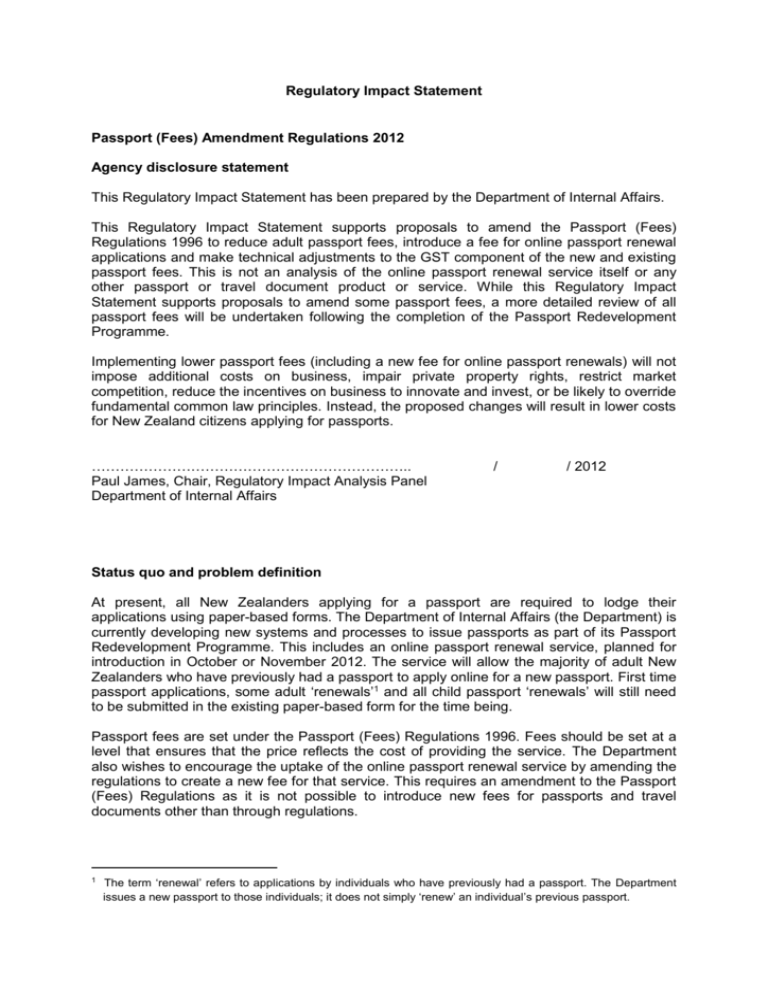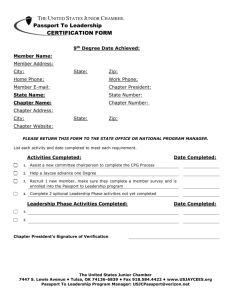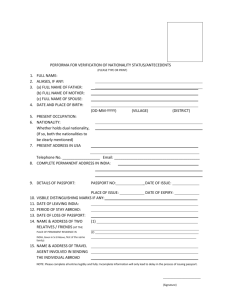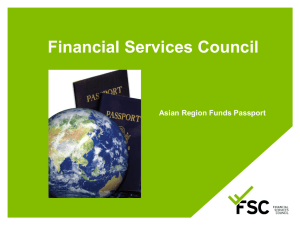Regulatory Impact Statement - Department of Internal Affairs
advertisement

Regulatory Impact Statement Passport (Fees) Amendment Regulations 2012 Agency disclosure statement This Regulatory Impact Statement has been prepared by the Department of Internal Affairs. This Regulatory Impact Statement supports proposals to amend the Passport (Fees) Regulations 1996 to reduce adult passport fees, introduce a fee for online passport renewal applications and make technical adjustments to the GST component of the new and existing passport fees. This is not an analysis of the online passport renewal service itself or any other passport or travel document product or service. While this Regulatory Impact Statement supports proposals to amend some passport fees, a more detailed review of all passport fees will be undertaken following the completion of the Passport Redevelopment Programme. Implementing lower passport fees (including a new fee for online passport renewals) will not impose additional costs on business, impair private property rights, restrict market competition, reduce the incentives on business to innovate and invest, or be likely to override fundamental common law principles. Instead, the proposed changes will result in lower costs for New Zealand citizens applying for passports. ………………………………………………………….. Paul James, Chair, Regulatory Impact Analysis Panel Department of Internal Affairs / / 2012 Status quo and problem definition At present, all New Zealanders applying for a passport are required to lodge their applications using paper-based forms. The Department of Internal Affairs (the Department) is currently developing new systems and processes to issue passports as part of its Passport Redevelopment Programme. This includes an online passport renewal service, planned for introduction in October or November 2012. The service will allow the majority of adult New Zealanders who have previously had a passport to apply online for a new passport. First time passport applications, some adult ‘renewals’1 and all child passport ‘renewals’ will still need to be submitted in the existing paper-based form for the time being. Passport fees are set under the Passport (Fees) Regulations 1996. Fees should be set at a level that ensures that the price reflects the cost of providing the service. The Department also wishes to encourage the uptake of the online passport renewal service by amending the regulations to create a new fee for that service. This requires an amendment to the Passport (Fees) Regulations as it is not possible to introduce new fees for passports and travel documents other than through regulations. 1 The term ‘renewal’ refers to applications by individuals who have previously had a passport. The Department issues a new passport to those individuals; it does not simply ‘renew’ an individual’s previous passport. The Department uses a memorandum account to manage fluctuations in the operating surpluses and deficits for the provision of passport and travel document products on a full cost-recovery basis. The current fee structure contains a level of cross-subsidisation within passport fees as the fee for adult passports subsidises the cost of children’s passports, refugee travel documents2 and certificates of identity issued under the Passports Act 1992. Call out and urgent fees have been set above cost to discourage people from using these services as ‘business as usual’. These exceptions to full cost recovery are consistent with Treasury and Office of the Auditor General guidelines on pricing in the public sector. Since the passport validity period was changed from 10 years to five years (through an amendment to the Passports Act 1992 in 2005), passport application volumes have continued to grow. While a significant increase was expected, there has been an almost 40 per cent increase in application volumes over the last two years, which has exceeded original expectations. Over the same period, there have been limited increases in fixed costs, and modest savings have begun to be realised from the implementation of the Passport Redevelopment Programme, the combined effect of which have held overall cost increases in the period to around 32 per cent. The current production costs for adult and child passports, current fees and forecast volumes for the 2012/13 financial year are as follows: Table 1: Breakdown of passport production costs, fees, and forecast volume Type passport of Current production costs Current fee Forecast volume (2012/13) (incl GST) (incl GST) Adult – new (AN) $138 ($151 with subsidy*) $153.30 42,000 Adult – renewal (AR) $128 ($141 with subsidy*) $153.30 345,000 Adult – online renewal (AO) Expected production costs: $120 ($133 with subsidy*) No current fee 115,000 Child – new (CN) $152 $81.70 (subsidised by adult passport fees) 62,000 Child – renewal (CR) $143 $81.70 (subsidised by adult passport fees) 62,000 * The current fees for adult passports include a subsidy of $13.00 for child passports, refugee travel documents and certificates of identity issued under the Passports Act 1992. Consequently the balance of the Passports Memorandum Account has increased significantly since 2008, and by close to $18 million in the last two years. At 30 June 2008, the balance was $3.481 million; at 30 June 2010 it was $9.457 million; at 30 June 2012, it was $27.368 million (subject to audit). Annual revenue for 2010/11 was $79.799 million and in 2011/12 was $87.071 million (subject to audit). It is appropriate to review passport fees, to ensure this surplus is decreased and that fees are better aligned with current and anticipated production costs. 2 Fees for refugee travel documents are set at the same rate as for child’s passports (the lowest passport fee), to give effect to the 1951 United Nations Convention Relating to the Status of Refugees. 2 Objectives Passport fees should be set to recover the full cost of passport operations including overheads. A principle of fee-setting for public sector products is that the cost of a service should be met at the time of supply. While it is appropriate to use memorandum accounts to manage fluctuations in the operating surpluses and deficits for the provision of products provided on a full cost-recovery basis, there should be no cross-subsidisation over the longterm for the provision of the same service by former, current or potential future users. Therefore, if large surpluses or deficits accumulate, fees should be reviewed in a timely fashion, to ensure that fees are recalibrated to align with current and anticipated future costs. Financial modelling for new fees must balance a number of factors, including recalibrating fees so they do not exceed annual costs, reducing the surplus in the memorandum account, anticipating the timing of benefits realisation of the Passport Redevelopment Programme, and accounting for forecast changes to volume and cost. In balancing these factors across a high volume of transactions and annual revenue, relatively small variations away from forecast cost and volume can have significant impacts on the memorandum account balance. In addition, frequent fee re-adjustments are undesirable. Approaches that create greater price stability are preferable. The Department has undertaken financial modelling based on the following principles: A. There should be a price differential between the online renewal service and the paperbased application process to account for lower processing costs and to help encourage uptake of the online service. There are expected to be reduced direct and indirect costs associated with customer interaction and handling processes (including checking, receipting and scanning applications) for online applications. The price differential would bolster the other incentives for individuals to use the online service which are greater convenience and ease of use. B. It is important to maintain sustainability of the memorandum account and account for fluctuations in costs and volumes over time. While the balance of the memorandum account should trend to zero over time, for modelling purposes the Department has projected the balance reducing to approximately $3 million over the relevant periods. This accounts for potential errors in modelling assumptions, and would cover any unexpected cost and/or volume variations. A full fee review following the redevelopment programme’s completion will ensure actual benefits and cost savings are well understood when calculating future fees. C. Fees for adult passports should continue to subsidise the cost of child passports to a certain extent. The Department considered whether it should remove the subsidy for child passports as the cost of producing a child passport is marginally higher than the cost of producing an adult passport. This would result in a larger reduction in the cost of an adult passport but would increase the price of a child’s passport. This is likely to attract adverse public reaction given that, historically, fees charged to children have been less than fees charged to adults. Assumptions for costing for online service fee The introduction of online passport renewals contributes to the Government’s Better Public Services ‘Results for New Zealanders’. Result 10 has the objective of enabling New Zealanders to complete their transactions with the Government easily in a digital environment. The target for this result is that “an average of 70 per cent of New Zealanders’ most common transactions with government will be completed in a digital environment”. This includes renewing passports online. It is proposed that a new fee for using the online service would come into effect from the time the service is made available to the public. 3 The Department has considered similar initiatives across government to understand the likely level of uptake for the online service, given that existing paper-based application processes will also need to be retained. An analysis of other online services developed by the Department, the New Zealand Transport Agency and the Inland Revenue Department, indicates that levels of uptake would be expected to start at 30 per cent. Technical changes On 1 October 2010, GST increased from 12.5 per cent to 15 per cent. Under section 78 of the Goods and Services Tax Act 1985, when the GST rate changes, fees in other Acts or regulations are deemed to be modified to reflect the change. While amending the regulations the opportunity should be taken to ensure that they expressly state the fees including the current rate of GST, at the same time as introducing the new fee for the online service. Alternatively, the regulations could express the fees as being exclusive of GST, with the relevant rate of GST added on at the time of application. It is a drafting matter as to which of these approaches is appropriate, but expressing the fees as GST-exclusive may be the best approach to address the following matter. Technical adjustments are also required to reflect section 11A(1)(k) of the Goods and Services Tax Act 1985. This provides that services that are supplied to a person who is a non-resident and who is outside New Zealand at the time the services are performed must include GST at zero per cent. The fees set out in the regulations for applications lodged in the Department’s London and Sydney offices include GST at zero per cent. However the regulations do not expressly allow the Department to deduct the GST portion of the fee for applications lodged in New Zealand where the applicant is a non-resident applying from overseas. The opportunity should be taken to make this clear in the regulations, including for the new online passport application fee. Regulatory Impact Analysis Status quo Under the status quo, the Department could continue to apply the current fees, including applying the fee of $153.30 for an adult passport for all applications lodged using the new online passport renewal service. The Department would undertake a full fees review at the end of the Passports Redevelopment Programme. This would ensure that the actual benefits and cost savings associated with the redevelopment programme are well understood when calculating future fees. However, under this approach, the balance of the Passports Memorandum Account would be likely to continue to increase, particularly as the expected benefits of the Passport Redevelopment Programme are realised over time. Furthermore, this would not provide an incentive for applicants to make use of the online service rather than the paper-based service, and would not reflect the expected reduced costs for processing applications lodged through the online service. The Department’s costing work for the new online service indicates that there would be reduced direct and indirect costs associated with customer interaction and handling processes (including checking, receipting and scanning applications). The direct labour cost savings of these activities suggest that the online process will save approximately $10 to $12 per application. Indirect cost savings that will be realised over a longer timeframe (for example, the share of departmental overheads) are estimated to be approximately $8 per application. Savings are therefore forecast to total approximately $20 per application from the current total cost for producing all adult passports. These savings are inclusive of GST. 4 Funding for passport services is predominantly sourced from third party fees. Fees for services provided to third parties under statutory authority in a non-contestable environment should be set on a cost recovery basis. Retaining the current level of fees, and applying the current fee to online passport renewals would not mean that the fees are charged on a cost recovery basis only. For this reason, the status quo is not recommended. Non-regulatory options It is not possible to make changes to passport fees without changes to the regulations. Regulatory options Developing regulatory options must balance the need for reducing the surplus in the memorandum account, while ensuring that fees do not exceed current and future anticipated costs and providing for price stability and sustainability of the memorandum account. In doing so, there are choices about three matters: a. Over what time period should the memorandum account balance be reduced? Reducing the memorandum account over shorter terms (e.g. one or two years) would result in the highest level of fee reductions immediately. However, the reductions would necessarily be short-lived and fees would need to increase over the short to medium and long term depending on the level of price reduction below the cost of production. In particular, the Department does not consider that reducing the memorandum account surplus over a one-to-two year term is desirable. The memorandum account would very quickly fall into deficit and fees would need to be increased to close to their current levels in late 2013 or 2014. Increasing passport fees so soon after decreasing them is unlikely to be acceptable to the public. The Department considers that the scenarios that reduce the surplus in the memorandum account over three, four or five-year periods are the most desirable. These scenarios are more sustainable in the long term and will not result in fees being increased as soon or by as much as would be the case with the short-term scenarios. Reducing the surplus over a three-year period would require fee increases in 2015 to maintain the memorandum account balance at a sustainable level, while a four-year period would require fee increases in 2016. Reducing fees set under a five-year scenario would be more sustainable (and would create greater stability for fees) as efficiency gains from the Passport Redevelopment Programme will, over the long-term, reduce the cost of production. Adopting a five-year approach would align with the passport duration life, and would mean that consistent fees would apply to everyone who was due to renew their passports upon their expiry. This is the Department’s preference. b. Should the fees reflect the cost differential between producing passports for first-time applicants and those renewing their passports, or should the fees smooth the costs of production across those applicants? Differentiating between first-time applicants and those renewing their passports differs from the current situation where all applicants pay the same fee. Splitting fees does introduce more complexity, for the public and administratively. However, it could be argued that there is a basis to reduce fees (funded from the surplus that has accumulated in the memorandum account) only for those renewing their passports given that they have paid higher costs in the past, which first-time applicants have not. There are also lower costs associated with renewing passports compared with first-time applicants, particularly in relation to verifying the identity of the applicant. The lower fee proposed for online renewals would recognise the lower costs involved in processing those, and encourage uptake of the new service. 5 There is also an argument that fees for first-time applicants should also be set at a level that does not excessively cross-subsidise other applicants and unreasonably exceed production costs. Therefore first-time applicants should be given the benefit of reduced fees as well as those who are renewing their passports. A split between the fees for first-time applicants and renewal applicants could be implemented to reflect the production cost differential between these types of applications. This would provide a fair balance between the various factors. Given the higher costs involved with producing passports through the Department’s overseas offices (London and Sydney), and in providing urgent processing and call out services (higher fees for which are set to discourage these services being treated as ‘business as usual’), the Department considers that there should not be any change to those fees at this time. c. Should the fee for children’s passports remain at the current level, or should that fee be reduced to remain at about half the level of adult fees? Currently, the fee for a child’s passport is approximately 53 per cent of the adult’s passport fee level. Maintaining the fee for a child’s passport at the current level would result in greater reductions in the fee for adult passports due to reduced crosssubsidisation. Maintaining relativity between the fees would mean that the fees for both adult and child passports would be reduced. However, given the higher costs involved for processing child passport applications, it is reasonable to maintain child passport fees at current levels. A wide range of permutations for setting the fees for passport products is possible to give effect to these choices. Specific options for fee combinations will be presented to Cabinet for consideration. Consultation The Treasury has been consulted on the proposed changes to passport fees and the Inland Revenue Department has been consulted on the technical GST-related drafting changes. We consider that there should not be any public consultation on the proposed fee changes. This is because: the lack of public consultation will not pose any disadvantage to the public as the proposals involve introducing reduced fees and, in respect of the introduction of the new online service, the existing paper-based application process will be retained; if there was a public consultation period, potential applicants may hold off applying for new passports or renewing their passports until after the new fees are introduced, causing a spike in application volumes in the period after the new fee is introduced; and there may be public dissatisfaction if the online renewal fee is set at $153.30 when the new online application process is introduced (the same fee as paper-based applications) and then reduced within a short period (e.g. a few months later) due to the time public consultation would take. We consider that these factors outweigh the potential risks of not consulting publicly on the proposal. Conclusions The Department’s preferred option is to reduce fees for all adult applicants, and to reduce the balance of the passports memorandum account over a five-year period. Split fees are proposed for first-time applicants, and those renewing passports. The lowest fees should be prescribed for those using the online service, to encourage uptake of the service and reflect the lower production costs involved. The Department’s modelling of this option results in 6 proposed new fees (with corresponding decreases from the current adult passport fee of $153.30) of: first-time adult passport application: $140.00 (a decrease of $13.30, or 8.7%); paper-based adult passport renewal: $134.50 (a decrease of $18.80, or 12.3%); and online adult passport renewal: $124.50 (a decrease of $28.80, or 18.8%). Implementation The new fees will be implemented at the same time as the implementation of the online passport renewal system. It is expected this service will be available to the public from midOctober to early November 2012. Standard processes will be used to notify the public of the new service and fees, and to process the fees with applications. Monitoring, evaluation and review A detailed review of all passport fees, including the new online fee, will be undertaken following the completion of the Passport Redevelopment Programme in 2013/14. The review would look at the efficiencies of the system, the uptake of the online passport renewal service and the financial state of the passports memorandum account. 7



